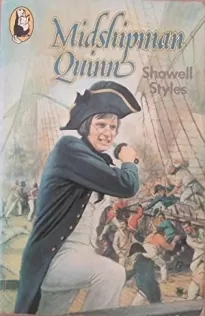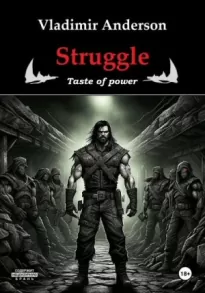Midshipman Quinn

- Автор: Showell Styles
- Жанр: Исторические приключения / Морские приключения
- Дата выхода: 1956
Читать книгу "Midshipman Quinn"
— 2 —
It was not an uncommon punishment for midshipmen to be "mastheaded" — sent to the top of the ship's mainmast to stay there until they were told to come down. But to send a boy there in a full gale, with the ship lying over on her side and the masts swooping and rearing before the gusts, was an almost unheard-of thing. Both the older midshipmen looked shocked, and Cocker even began a stammering protest which a glare from the First Lieutenant instantly silenced. As for Septimus, he took off his spectacles and put them into their case, trying hard not to show his dismay.
"That was an order, sir!" roared Mr. Pyke. "Up to the masthead with you, and step lively or I'll have you in irons!"
"Aye aye, sir!" said Septimus smartly, and made for the companionway leading to the deck.
As he passed Barry, he felt something pushed urgently against him, and grasped it. It was Barry's tarpaulin coat.
Lieutenant Pyke followed him on deck without another word, and turned his back on Septimus to go to the quarterdeck. The midshipman wriggled into the waterproof jacket before crossing the slippery deck. To gain the weather bulwarks he had to claw his way up a slope of wet planking against repeated showers of spray, and when he climbed into the mainmast rigging-where horizontal rope "ratlines" between the straining stays of the mast made a precarious ladder — a positive spout of sea water lashed him from head to foot and would have soaked him to the skin had it not been for Barry's tarpaulin coat. Flattened against the rigging by the wind, he began to climb.
With the frigate heeled over at so steep an angle, the first part of the climb was not particularly difficult. The mainmast was leaning away from him, so that the ascent of the shrouds was not so steep as it would have been if she had been on an even keel. But the fury of the gale, and its hundreds of deafening voices, was bewildering. The great mainyard was braced round, and although the mainsail was double-reefed its big curve of canvas was trembling and thundering as if it would tear itself away at any moment. Every rope in the network of cordage that supported the Althea's three masts sang shrilly with its own particular note, and the din of the seas against her wooden hull added a deeper note to the chorus.
Septimus did not hesitate, in such weather, to use the "lubber's hole" when he came to the maintop-the wooden platform from the edges of which ran the shrouds supporting the upper part of the mast. The frigate's topmen, the chosen seamen who could go aloft in all weathers to reef or furl sails, disdained this easy way cut in the platform, and would always climb over its edge by means of the futtock-shrouds, hanging on with their backs turned to the deck far below. But Septimus was not a topman. As Mr. Pyke very well knew, this manker-like climbing in the srider's-web of the rigging was the one thing Septimus most disliked.
On the reeling planking of the maintop he paused for breath, with his arms hugging the big mast itself. The mast was groaning like a monster in pain, and he could feel its vibration under the force of the wind. But he felt certain that Lieutenant Pyke was watching him, and his pride would not let him pause too long. Setting his teeth, he swung himself round on to the shrouds again and fought his way upward.
The long ladder of rope was not at all steady. It slackened a little as the Althea rolled, then tautened suddenly again with a horrible creaking noise. Septimus was jerked and swung as he clutched and grabbed and clutched again, and he was exceedingly frightened, though he refused to admit it in his mind. Up, and up, and up, with the wild swerving of the mast growing ever more violent. It seemed a very long time before he got his weary hands over the topsail yard and somehow hauled himself on to it, to sit with his short legs dangling over the long spar and his arms clasped tightly round the topmast.
For a moment he stayed like that, with his eyes shut. The mast was like a bucking horse under him, trying to throw him off. Remembering that the three midshipmen had been wearing tarpaulin coats when last Mr. Preece instructed them in rope-splicing, he contrived to feel in the pocket of Barry's coat. As he expected, the fathom of light line used for splicing practice was coiled up in the pocket. Perched as he was, it was a perilous business getting the rope out and uncoiled, and when he did succeed in freeing it the wind streamed it out horizontally and all but snatched it from his hand. With infinite care he pushed one end of the line through the stout leather belt he wore and managed to lead it round the mast. A moment later he had joined the ends with a reef knot and was lashed securely to the mast.
Now, at last, he could look about him in safety — though not in comfort. His first glance showed him hurrying dark clouds overhead, clouds that seemed to race and halt and spin in every direction. When he realised that it was he, and not the clouds, that swung so violently between sea and sky, he felt sick and dizzy and had to shut his eyes again for a while. When he opened them it was to look down, and that downward glance was a terrifying one. Directly beneath him, very far below, was the angry sea, grey-green waves racing away from the ship's lee side and showing their white teeth in ridges of foam. Bringing his gaze inward a little he saw the frigate's deck looking like the deck of a toy ship, so small it seemed from that height above. At first he could see no human figures, for the men at the helm were hidden by the rigging and reefed sails of the mizzen-mast. But soon he made out a little group of men huddled under the weather bulwarks — the watch-on-deck standing by to obey any orders from the quarterdeck — and the sight made him feel a little less lonely up there on his reeling masthead.
Septimus was getting used to the dizzy circling of his wooden perch now, but it had needed considerable resolution to prevent himself from being sick. It was his habit, when in uncomfortable or dangerous situations, to look for the brighter aspects of such situations; and to take his mind off the ceaseless jerking and swaying he set himself to do so now. The outlook from the mainmast-head had nothing bright about it. On every side was the notchy black horizon of a stormy sea raging beneath a stormy sky. But Mr. Pyke's vindictive punishment had shown up two bright spots-the sympathy of his brother midshipmen. Cocker had made an attempt to protest against that punishment, Barry had made him take the tarpaulin jacket which was protecting him now — a welcome protection, for though it was August the gale had a bite in it. Septimus knew that his two messmates had a poor opinion of him, and he had held no very high opinion of them. This was the first time they had shown that they counted him as their comrade, for they had undoubtedly been on his side and against Pyke's revengeful order. He reflected that Cocker could not, after all, be quite such a bully as he tried to appear, and that Charles Barry had shown unexpected forethought in thrusting the jacket into his hand.
Another thought crossed his mind, too. It was easy enough to score off the quick-tempered First Lieutenant, but it would have been much wiser to hold his tongue when he knew that Mr. Pyke could inflict so uncomfortable a punishment. Mr. Midshipman Quinn was discovering that he had much to learn about men, as well as about ships.
His cheek was pressed against the smooth cold wood of the topmast, and it hid the forepart of the ship from him. Peering round it now, he could see the Althea's foremast little more than fifty feet away from him in mid-air. The highest tip of the foretopmast was just level with him. Below it, bellying from the yard and looking as if it was about to fly off across the ocean, was the reefed topsail which Lieutenant Pyke had ordered to be set and which Septimus had been unwise enough to criticise. Looking at its straining curve, he remembered what Mr. Preece had so confidentially told him that afternoon.
"Them topmast stays do need new rigging, indeed," the Welsh gunner's mate had said. "I tell you now, Mr. Quinn, sir, that it is tamn foolishness to hoist a tops'l — reef or no reef — on that mast in such a blow. Yess, indeed. But there is no telling Mr. Pyke. No, indeed! "
It would be a nasty mess, thought Septimus, if the rigging parted and the topmast came crashing down, as it would do. Its many stays would keep it from hurtling to the deck, but the seamen would have a difficult and dangerous job to clear the tangle in this gale. Lowering his gaze a little, he saw the round barrel-shape of the crow's-nest at the foot of the topmast, and the head and shoulders of the lookout protruding from it. Since there was little danger of hostile warships appearing in the Bay of Biscay, the lookout's main duty was to scan the seas ahead for possible floating wreckage or other obstructions dangerous to a speeding vessel, and the man had apparently not seen the midshipman be hind and above him. Septimus thought he recognised that mop of tow-coloured hair and those broad shoulders. It was a man called Tod Beamish, a seaman of gigantic size and immense strength.
An extra strong gust sent the frigate heeling over another five degrees and Septimus tightened his clutch on the mast. For a few sickening seconds he had the impression that she was going to turn completely over. Then she recovered herself, the tall mast to which he clung rising slowly again to its former angle. Of course the Althea was built to withstand such tremendous thrusts-he told himself that and felt reassured. All the same, the strain on that topmast with its violently-tugging sail must have been very great. He thanked his lucky stars that Lieutenant Pyke had not seen fit to hoist a reefed topsail on his own mast.
Already it seemed a long time since he had arrived at his present airy perch. How long, he wondered, would Pyke leave him up there? Presumably until Captain Sainsbury was due to come on deck. Septimus felt reasonably certain that the Althea's captain would order him down as soon as he discovered what Pyke had done. Among the frigate's crew it was said that Sainsbury was a hard man but just. He was not the officer to send a midshipman to the masthead in a full gale.
Septimus began to feel chilled and weak. He tried to forget his discomforts in thinking of the blue Mediterranean waters which they would be entering in a few days. What the Althea was to do in the Mediterranean he did not know. Captain Sainsbury was the only man aboard the frigate who knew what orders had been given him by Their Lordships of the Admiralty, and if he chose to keep those orders secret he could do so. The all-knowing Mr. Preece, placing a horny finger alongside his bulbous nose and looking extremely wise, had given it as his opinion that they were sailing under sealed orders.
"Cap'n, he'll open them orders when we reaches Gibraltar," he had said. "And if, as I thinks, we'm bound for an independent cruise — why, now, young gents, there'll be fighting aplenty and prize-money for every man Jack. Yess, indeed!"
The promise of fighting did not greatly excite Septimus. It was not pleasing to him to contemplate a hand-to-hand struggle with a Frenchman. But he knew that before and during and after such struggles a delicate science was brought into play, a science of manoeuvring for position, changing direction of attack, drawing off one's forces in a prudent and subtle manner. It was this side of warfare that appealed to young Mr. Quinn. In imagining himself in command of a cutter detailed to surprise a French garrison by night, he almost forgot the increasing discomfort of his position.
He was just at the point in his imaginary expedition when, having made a feint attack on the front of the enemy position, he led a desperate assault on the flank, when his vaguely-roaming eye saw the thin black line across the sky to windward. It was a long line of cloud, rapidly approaching, and he knew that it was what seamen called "a line squall". When that ominous line reached the Althea she would feel the sudden smiting of the squall — only for a moment, but the blow would be a heavy one. Septimus wondered whether those on deck had seen the coming danger, and clutched his topmast more tightly. Faint shouts from below told him that Mr. Pyke had seen the squall. The tiny figures of men ran across the deck in readiness to brace the yards, for the helmsman would bring the frigate's bows into the wind a little to meet the squall.
The line of cloud was almost upon them now: He felt the sudden increase of wind-pressure and the bending of the mast before it. The frigate dipped and swerved and Septimus swung like an inverted pendulum out and downward over the frothing sea. He closed his eyes — and then opened them quickly, for a splintering cr-r-ack! had come to his ears above the din of sea and wind.
He was in time to see the top spar of the foremast, only a short distance in front of him, lean over towards him faster and faster until it crashed down to hang with its rag of topsail torn and fluttering.





